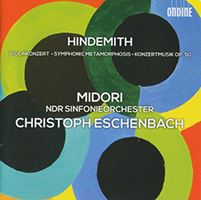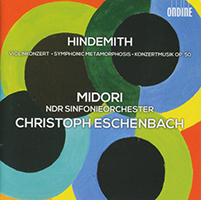
When I was a youngster in the 1950s I learned that the three greatest living composers were Stravinsky, Schoenberg, and Paul Hindemith.
Who?
Yes, Hindemith, who has undergone a reversal of fortune in the late 20th century, similar to what happened to Joachim Raff in the 19th. The biographer David Mason Greene had this explanation for Hindemith’s now-diminished stature:
Perhaps the phenomenon is merely the normal temporary rejection of a titan in reaction to what seems his previous overvaluation — abetted in this instance by the fact that form and tonality have not ben admired in certain influential quarters. Or perhaps it is because of the determined earnestness of Hindemith’s music, which seems to take itself too seriously even when it is trying to be light or parodistic.
Bad luck has also played a part. 2013 is the 50th anniversary of his death, but unfortunately also the overshadowing 200th anniversaries of the births of Wagner and Verdi. Nevertheless Ondine has recognized the occasion with a release of three of Hindemith’s finest works, his Violin Concerto, Symphonic Metamorphosis of Themes by Carl Maria von Weber, and Concert Music for Strings and Brass. The last is a double anniversary in a way, as it was commissioned by Serge Koussevitzky for the Boston Symphony’s own 50th anniversary in 1931.
The Concert Music, recorded a year before the other two works on this disk, receives the finest performance of the three. Conductor Christoph Eschenbach provides here a spirited and driving interpretation, with excellent contributions from the brass section of the NDR Sinfonie Orchester. The same drive animates the Metamorphosis, but the spirit wanes somewhat. The first movement whips by, seemingly only for speed’s sake. The jazzy interlude in the Turandot movement succumbs to Greene’s “determined earnestness” aspersion when it should sound like one of Hindemith’s Eisenhower-like smiles. Nevertheless, Eschenbach throughout the release does have a fine sense of architecture for these works.
Midori, a musician I admire greatly for her education initiatives here in the Bay Area, is at her best in the slow movement of the Concerto. Her very pure tone with an air of mystery is a joy to hear. In the outer movements, however, her approach is too cool and weak for the power and passion in the music. Eschenbach too holds back, resulting in an unfortunate lack of dynamic range. The recording quality is adequate, but lacks the depth to do justice to Hindemith’s large orchestral sonics.
This release is recommended for the Concert Music and the slow movement of the all-too-rarely heard Violin Concerto. When will someone play it again in San Francisco?

